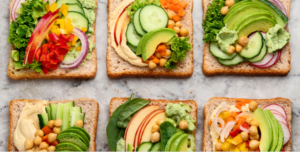Table of Contents
A plant-based food diet centers on foods derived from plants. This includes vegetables, fruits, nuts, seeds, oils, whole grains, legumes, and beans.
Embracing a plant-based food diet can lead to numerous health benefits, including weight loss, improved heart health, and a lower risk of chronic diseases. It often involves a reduction in the consumption of animal products, focusing on whole, minimally processed foods that are rich in nutrients.

This diet is not only beneficial for personal health but also for environmental sustainability, as it tends to have a lower carbon footprint compared to diets high in animal products. Transitioning to a plant-based diet can be an effective strategy for individuals looking to enhance their well-being while also considering ethical and ecological implications of their food choices.
Rise Of Plant based food Diets
More people every day choose foods from plants over meat. This change is not just a trend but a shift towards a healthier lifestyle. Plant-based diets are now popular around the world. They offer benefits for health, the planet, and animals too. Let’s explore why so many are saying yes to plant-based meals.
Shift In Consumer Eating Habits
- Health awareness: People know more about food and health now. They want to eat things that make them feel good and stay healthy.
- Taste and variety: Plant-based foods have become tastier. There are more choices than ever before.
- Convenience: Supermarkets and restaurants offer more plant-based options. It is easy for people to find these foods.
Environmental And Ethical Motivations
Reason
Impact
Eco-friendly
Plant foods need less water and land than meat. They create fewer greenhouse gases.
Sustainable future
Choosing plants over meat can help our planet last longer for everyone.
Animal welfare
Eating plant-based can save animals. It means fewer farm animals suffer.
Eating plants helps the Earth and animals. Many people feel good about this choice. They believe it is the right thing to do for a better world.
Health Benefits
Exploring a plant-based food diet brings a basket of health benefits to the table. Many people choose this green path for a healthier life. Let’s dive into how this diet can boost wellness and vitality.
Nutritional Advantages
Plant-based diets shine with nutritional power. They pack vitamins, minerals, and fiber into every bite. Plants are rich in nutrients that our bodies need to thrive. Here’s what stands out:
Vitamin C: Found in fruits and vegetables; boosts the immune system.
Antioxidants: Present in plants; protect cells from damage.
Fiber: High in vegetables, fruits, and whole grains; aids digestion and heart health.
Healthy Fats: Nuts and seeds offer omega-3 fatty acids; essential for brain function.
People eating plants often consume fewer calories but get more nutrients. Plant eaters tend to have healthier body weights.
Chronic Disease Prevention
A plant-based diet is a shield against many chronic diseases. It reduces the risk of health issues like heart disease and diabetes. Here’s the evidence:
Disease
Prevention Benefit
Heart Disease
Less cholesterol and saturated fat intake lowers heart disease risk.
Type 2 Diabetes
High fiber and whole grains help manage blood sugar levels.
Cancer
Antioxidants and phytochemicals in plants may reduce cancer risk.
Studies show that plant-based diets can improve blood pressure and cholesterol levels. This means a stronger heart and a longer life.
Key Components Of A Plant-based Diet
Embracing a plant-based diet means more than just eating your greens. Key components of this diet ensure you get all the nourishment your body needs. Let’s explore these components and understand how to build a healthy and satisfying plant-based meal plan.
Essential Nutrients
A plant-based diet is rich in essential nutrients necessary for optimal health. These include:
Protein: Found in beans, lentils, tofu, and tempeh.
Fiber: Abundant in fruits, vegetables, whole grains, and legumes.
Healthy Fats: Sourced from avocados, nuts, seeds, and olive oil.
Vitamins and Minerals: Plentiful in a colorful variety of plant foods.
Eat a variety of these foods each day to cover your nutrient bases. Remember to include vitamin B12 supplements, as this vitamin is not naturally present in plant foods.
Whole Foods Vs Processed Options
Focusing on whole foods is crucial for a healthful plant-based diet. These are minimally processed and closest to their natural state. Compare the benefits of whole foods with processed options in the table below:
Whole Foods
Processed Options
Richer in nutrients
Often stripped of nutrients
Free from additives
May contain additives and preservatives
High in fiber
Usually lower in fiber
Supports overall health
Can lead to health issues if consumed in excess
Choose whole grains like brown rice, quinoa, and whole wheat over refined grains. Opt for fresh fruits and veggies rather than canned or packaged snacks. Your body will thank you for feeding it foods that are as close to their source as possible.
Common Myths And Misconceptions
When exploring the plant-based diet, it’s easy to stumble upon conflicting information. Certain myths can discourage people from trying this healthy lifestyle. Let’s bust some common myths and shed light on the facts.
Protein Sources And Requirements
One of the biggest myths is that plant-based diets lack protein. This is far from the truth. Plants can provide all the protein needed for optimal health. Let’s look at some plant-based protein powerhouses:
Lentils: A cup of cooked lentils packs about 18 grams of protein.
Chickpeas: Great for hummus or salads, they offer about 15 grams per cup.
Quinoa: This grain contains all nine essential amino acids and has 8 grams per cup.
Almonds: Snack on these for 6 grams of protein per ounce.
Spinach: Even greens have protein, with about 5 grams per cup.
These sources prove that meeting protein requirements on a plant-based diet is not only possible but simple.
Impact On Energy Levels
Another misconception is that a plant-based diet will leave you tired. In reality, plant foods are rich in complex carbohydrates, the body’s primary energy source. Here’s how they can boost your energy:
Food
Energy-Boosting Benefit
Bananas
Packed with potassium and vitamins for sustained energy.
Sweet Potatoes
High in fiber and complex carbs for long-lasting fuel.
Oats
Rich in B-vitamins that help convert food into energy.
Beans
Contain iron and protein for energy and endurance.
Eating a variety of these foods can help maintain high energy levels throughout the day.
Transitioning To Plant-based Eating
Moving towards a plant-based diet might seem challenging at first. It’s about finding new foods that you enjoy and learning new ways to cook them. The key is to take it step-by-step and enjoy the journey towards healthier eating habits.

Starting With Small Changes
Begin by incorporating more fruits and vegetables into your meals. Try the following strategies:
Add a fruit bowl at breakfast or as a snack.
Include a salad with every dinner.
Swap out some meat portions with beans or lentils.
These small steps can lead to bigger changes in your diet over time.
Meal Planning And Recipes
Planning your meals can make the transition smoother. Here’s a simple way to start:
Choose plant-based recipes for the week.
Make a shopping list based on these recipes.
Prep meals in advance to save time.
Discovering new recipes can be fun and keeps your meals exciting. Try different cuisines like Italian pasta with tomato sauce or Indian curry with chickpeas.
Day
Monday |
Wednesday |
Friday |
Meal
Lunch |
Dinner |
Breakfast |
Recipe Idea
Lunch |
Dinner |
Breakfast |
Using a table like this helps you track your meals and ensures a variety of dishes throughout the week.
Social And Economic Considerations
Choosing a plant-based diet comes with changes that touch on social interactions and finances. When picking this lifestyle, it’s crucial to understand these aspects. Dining out and budgeting can differ from what one might be used to with traditional diets.
Dining Out Challenges
Plant-based eaters often face limited choices at restaurants. While some venues cater to this lifestyle, others may not. This can lead to a need for extra planning when eating out.
Check menus online ahead of time.
Look for restaurants with plant-based options.
Communicate dietary preferences to the staff.
These steps ensure a smoother dining experience. They also help support establishments that cater to diverse diets.
Cost Comparison With Traditional Diets
People often think plant-based diets are expensive. Yet, the cost varies based on food choices and shopping habits. Let’s explore a basic comparison:
Food Item
Plant-Based Option
Traditional Option
Protein Source |
Milk |
Snacks |
Beans and Lentils |
Almond or Soy Milk |
Fruits and Nuts |
Meat and Poultry |
Cow’s Milk |
Chips and Cookies |
Plant-based proteins like beans are often cheaper than meat. Alternatives to dairy can sometimes be more costly, but prices are decreasing. Snack choices such as fruits may be comparable in price to traditional snacks.
By choosing whole foods and cooking at home, one can manage costs effectively. It’s also important to consider the long-term health benefits and potential healthcare savings.
The Future Of Plant-based Diets
Imagine a world where every meal is both delicious and earth-friendly. This is the vision behind the growing trend of plant-based diets. With more people turning to fruits, vegetables, nuts, and legumes, the future looks green in more ways than one. Health benefits and environmental sustainability are the driving forces here. As we peek into the future, it’s clear that plant-based diets are not just a fad; they’re a shift towards a better world.
Innovation In Food Technology
Food tech is revolutionizing what we eat. Companies are creating meat alternatives that taste like the real thing. They’re using plants to do it. This means fewer animals raised for food and less strain on the planet. Here’s a glimpse at the tech:
Lab-grown meats that require no farming.
Fermentation techniques to improve taste and texture.
3D food printing for customizable nutrition.
These innovations could lead to a more sustainable food system. They are making plant-based eating more exciting.
Potential Long-term Global Impact
Adopting plant-based diets has huge potential benefits. These include both personal health and the health of our planet. Let’s break down the impact:
Aspect
Impact
Health |
Environment |
Economy |
Reduced risk of chronic diseases. |
Lower carbon footprint and less water usage. |
Shift in job opportunities towards sustainable practices. |
The ripple effects are vast. From cleaner air to healthier populations, the benefits touch every corner of society. We could see a decrease in healthcare costs and a boost in global well-being.
Conclusion
Embracing a plant-based diet can lead to numerous health benefits and environmental advantages. It’s a sustainable choice that supports wellness and conserves resources. Whether you’re seeking improved health or wanting to reduce your carbon footprint, consider making plant-based foods a staple in your diet.
Start exploring the colorful world of fruits, vegetables, and whole grains today!
Frequently Asked Questions
What Foods Can You Eat On A Plant-based Diet?
On a plant-based diet, you can enjoy fruits, vegetables, legumes, nuts, seeds, and whole grains. Opt for plant-based oils, such as olive or avocado oil, for cooking.
Can You Eat Eggs On A Plant-based Diet?
Eggs are not included in a strict plant-based diet, as it focuses on foods derived solely from plants. However, those following a more flexible plant-based eating pattern, like ovo-vegetarianism, may choose to eat eggs.
What Are 5 Plant-based Foods?
Five plant-based foods include lentils, quinoa, almonds, spinach, and sweet potatoes. These options offer a variety of nutrients and are versatile in recipes.
What Is The Downside Of A Plant-based Diet?
A plant-based diet may lead to nutrient deficiencies, such as B12, iron, calcium, and omega-3 fatty acids. It also requires careful meal planning to ensure complete protein intake and can be challenging when dining out or with limited food variety.


